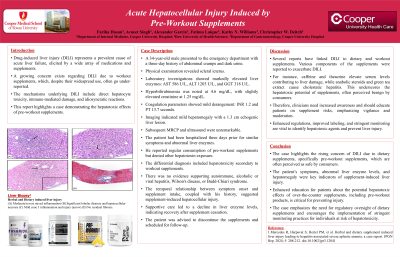Sunday Poster Session
Category: Liver
P1348 - Acute Hepatocellular Injury Induced by Pre-Workout Supplements
Sunday, October 27, 2024
3:30 PM - 7:00 PM ET
Location: Exhibit Hall E

Has Audio

Fariha Hasan, MD
Cooper University Hospital
Philadelphia, PA
Presenting Author(s)
Fariha Hasan, MD1, Avneet Singh, DO2, Alexander Garcia, DO2, Fatima Laique, MBBS3, Kathy N. Williams, MD, MS1, Christopher Deitch, MD4
1Cooper University Hospital, Philadelphia, PA; 2Cooper University Hospital, Camden, NJ; 3Dow University of Health Sciences, Karachi, Sindh, Pakistan; 4Cooper Health Gastroenterology, Camden, NJ
Introduction: Drug-induced liver injury (DILI) represents a prevalent cause of acute liver failure, elicited by a wide array of medications and supplements. A growing concern exists regarding DILI due to workout supplements, which, despite their widespread use, often go under-reported. The mechanisms underlying DILI include direct hepatocyte toxicity, immune-mediated damage, and idiosyncratic reactions. This report highlights a case demonstrating the hepatotoxic effects of pre-workout supplements.
Case Description/Methods: A 34-year-old male presented to the emergency department with a three-day history of abdominal cramps and dark urine. Physical examination revealed scleral icterus. Laboratory investigations showed markedly elevated liver enzymes: AST 586 U/L, ALT 1203 U/L, and GGT 318 U/L. Hyperbilirubinemia was noted at 4.6 mg/dL, with slightly elevated creatinine at 1.25 mg/dL. Coagulation parameters showed mild derangement: INR 1.2 and PT 13.7 seconds. Imaging indicated mild hepatomegaly with a 1.3 cm echogenic liver lesion. Subsequent MRCP and ultrasound were unremarkable. The patient had been hospitalized three days prior for similar symptoms and abnormal liver enzymes. He reported regular consumption of pre-workout supplements but denied other hepatotoxin exposure. The differential diagnosis included hepatotoxicity secondary to workout supplements. There was no evidence supporting autoimmune, alcoholic or viral hepatitis, Wilson's disease, or Budd-Chiari syndrome. The temporal relationship between symptom onset and supplement intake, coupled with his history, suggested supplement-induced hepatocellular injury. Supportive care led to a decline in liver enzyme levels, indicating recovery after supplement cessation. The patient was advised to discontinue the supplements and scheduled for follow-up.
Discussion: Several reports have linked DILI to dietary and workout supplements. Various components of the supplements were reported to exacerbate DILI. For instance, caffeine and theacrine elevate serum levels contributing to liver damage, while anabolic steroids and green tea extract causes cholestatic hepatitis. This underscores the hepatotoxic potential of supplements, often perceived benign by consumers. Therefore, clinicians need increased awareness and should educate patients on supplement risks, emphasizing vigilance and moderation. Enhanced regulations, improved labeling, and stringent monitoring are vital to identify hepatotoxic agents and prevent liver injury.
Disclosures:
Fariha Hasan, MD1, Avneet Singh, DO2, Alexander Garcia, DO2, Fatima Laique, MBBS3, Kathy N. Williams, MD, MS1, Christopher Deitch, MD4. P1348 - Acute Hepatocellular Injury Induced by Pre-Workout Supplements, ACG 2024 Annual Scientific Meeting Abstracts. Philadelphia, PA: American College of Gastroenterology.
1Cooper University Hospital, Philadelphia, PA; 2Cooper University Hospital, Camden, NJ; 3Dow University of Health Sciences, Karachi, Sindh, Pakistan; 4Cooper Health Gastroenterology, Camden, NJ
Introduction: Drug-induced liver injury (DILI) represents a prevalent cause of acute liver failure, elicited by a wide array of medications and supplements. A growing concern exists regarding DILI due to workout supplements, which, despite their widespread use, often go under-reported. The mechanisms underlying DILI include direct hepatocyte toxicity, immune-mediated damage, and idiosyncratic reactions. This report highlights a case demonstrating the hepatotoxic effects of pre-workout supplements.
Case Description/Methods: A 34-year-old male presented to the emergency department with a three-day history of abdominal cramps and dark urine. Physical examination revealed scleral icterus. Laboratory investigations showed markedly elevated liver enzymes: AST 586 U/L, ALT 1203 U/L, and GGT 318 U/L. Hyperbilirubinemia was noted at 4.6 mg/dL, with slightly elevated creatinine at 1.25 mg/dL. Coagulation parameters showed mild derangement: INR 1.2 and PT 13.7 seconds. Imaging indicated mild hepatomegaly with a 1.3 cm echogenic liver lesion. Subsequent MRCP and ultrasound were unremarkable. The patient had been hospitalized three days prior for similar symptoms and abnormal liver enzymes. He reported regular consumption of pre-workout supplements but denied other hepatotoxin exposure. The differential diagnosis included hepatotoxicity secondary to workout supplements. There was no evidence supporting autoimmune, alcoholic or viral hepatitis, Wilson's disease, or Budd-Chiari syndrome. The temporal relationship between symptom onset and supplement intake, coupled with his history, suggested supplement-induced hepatocellular injury. Supportive care led to a decline in liver enzyme levels, indicating recovery after supplement cessation. The patient was advised to discontinue the supplements and scheduled for follow-up.
Discussion: Several reports have linked DILI to dietary and workout supplements. Various components of the supplements were reported to exacerbate DILI. For instance, caffeine and theacrine elevate serum levels contributing to liver damage, while anabolic steroids and green tea extract causes cholestatic hepatitis. This underscores the hepatotoxic potential of supplements, often perceived benign by consumers. Therefore, clinicians need increased awareness and should educate patients on supplement risks, emphasizing vigilance and moderation. Enhanced regulations, improved labeling, and stringent monitoring are vital to identify hepatotoxic agents and prevent liver injury.
Disclosures:
Fariha Hasan indicated no relevant financial relationships.
Avneet Singh indicated no relevant financial relationships.
Alexander Garcia indicated no relevant financial relationships.
Fatima Laique indicated no relevant financial relationships.
Kathy Williams indicated no relevant financial relationships.
Christopher Deitch indicated no relevant financial relationships.
Fariha Hasan, MD1, Avneet Singh, DO2, Alexander Garcia, DO2, Fatima Laique, MBBS3, Kathy N. Williams, MD, MS1, Christopher Deitch, MD4. P1348 - Acute Hepatocellular Injury Induced by Pre-Workout Supplements, ACG 2024 Annual Scientific Meeting Abstracts. Philadelphia, PA: American College of Gastroenterology.
